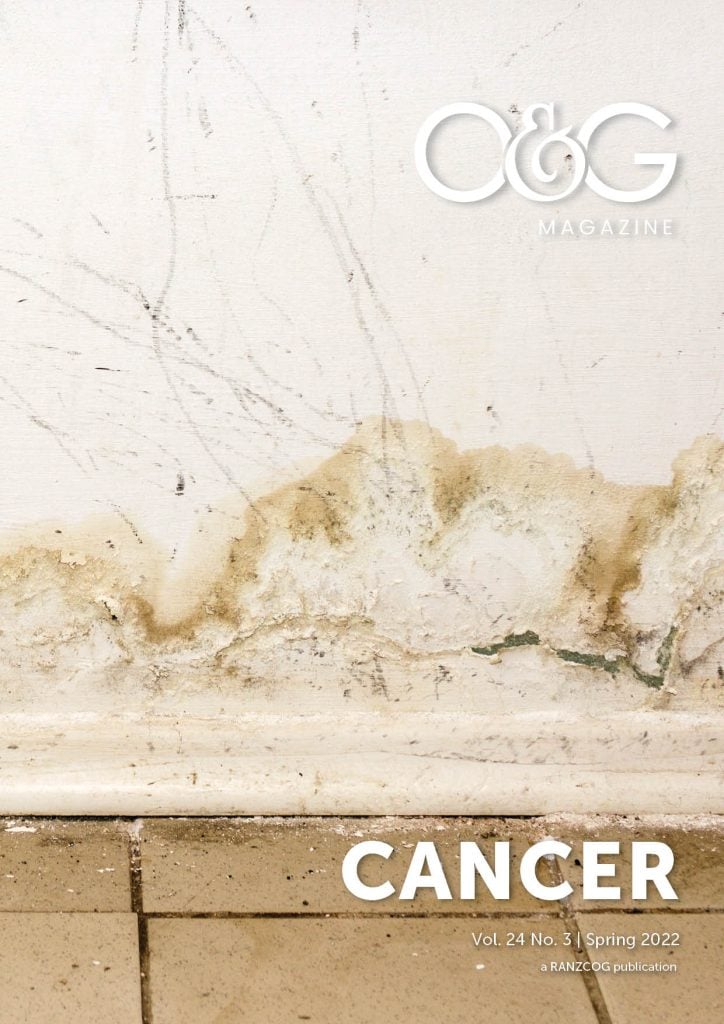As GPs, gynaecologists and obstetricians, we are used to supporting our patients through important transitions like puberty, pregnancy and menopause. When our patients have cancer, there are also important transitions. At these times, it may be challenging for patients to adapt to a new reality where illness becomes a larger part of their lives.
Uncertainty can begin at the screening stage for patients at high risk of cancer where complex surveillance regimes can lead to chronic anxiety.1 2 In the early stages of diagnosis, particularly when diagnoses are difficult to make, patients will often resent the lack of certainty, and may feel misunderstood, isolated and vulnerable.3
At diagnosis, a person’s identity forcibly undergoes transformation4 with some writers suggesting that the assumption of an identity as ‘a cancer patient’ is likely to be permanent, even with recovery.5 The moment of diagnosis is ‘marked by disorientation, a sense of loss and of loss of control, and a sense of uncertainty’. Many lose their social connections when friends and family are unable to cope with the world of illness and they can become profoundly isolated.6
During remission, patients regain their autonomy and agency, but are often unable to regain the sense of self they had before they were ill. There is a sense of ‘relentless vigilance’ as patients scan their bodies for recurrence.7 The person they expected to be, and the life course they expected to follow are gone, and the new identities they have adopted are unfamiliar and often frightening. It can be difficult to re-engage with their home and work because the familiar can seem strange and social relationships can be uncomfortable.
Liminality is a useful concept for considering the lived experience of uncertainly in illnesses like cancer.8 9 Liminality describes situations in which people find themselves ‘betwixt and between’ states of being (including categories of health and illness). The term liminality, adopted from anthropology10 was originally used to describe a life stage in which we move from one phase to another, such as adolescence, pregnancy, and bereavement. Cancer has its own liminality. The time between a positive screening test and a definitive diagnosis, is a time of great uncertainty. The patient is not well, but not yet ‘sick’ and they are stuck in a no-man’s-land in terms of their identity. The time of remission is similar. They are no longer ‘sick’ but they are not exactly ‘well’. When these times cross over with other transitions, like developing cancer in pregnancy, or treating cancer with an oophorectomy that causes a surgical menopause, it can be particularly difficult to manage. Patients describe being in familiar situations but feeling out of place because they are profoundly changed.
Change is not always negative; many patients describe positive change following transitions. However, some patients need help coping with the identity shifts involved in navigating the changes that cancer requires.
Coping
At times of great uncertainty, patients may need help with managing the stress and anxiety. Coping strategies include four distinct categories, each with their own focus.11 The following discusses common approaches to coping and is extracted from ‘illness uncertainty and risk management for people with cancer’.12
Appraisal
Appraisal focuses on how a person perceives the threat posed by their illness and how they understand their capacity to cope. Different patients will appraise the same diagnosis differently: one patient may see breast cancer as inevitably fatal, another will see it as an acute illness with a painful but inevitable recovery. People also differ in their sense of their own capacity to cope. While one patient may be confident they have the financial, social, emotional and physical resources to manage their illness, another patient may be overwhelmed by the prospect, and feel completely unable to manage.
Appraisal strategies
Appraisal strategies help patients to accurately and realistically understand the threat their illness poses, and their ability to cope, given the support they are likely to receive. These strategies involve education, with a clear description of the likely course of the disease and the treatment plan. Accurate appraisal is supported by written information, lived experience stories, peer support and time to ask questions with the relevant clinical team to address concerns. GPs may need to help their patients recognise their own strengths by reminding them of previous situations that they have managed well.
Problem-solving
Problem-solving involves managing practical issues, such as appointments, financial concerns, work and the management of treatment regimes.
Problem-solving strategies
Problem-solving strategies include helping patients prioritise, coordinating care, supporting patients with their administrative needs, such as work certificates, and discussing potential solutions to personal needs, such as parenting responsibilities.
Emotion-focused coping
Emotion-focused coping includes managing the distress associated with uncertainty, fear, pain and disability.
Emotion-focused strategies
Emotion-focused strategies include positive strategies, such as exercise, social support, empathic connection with an appropriate healthcare provider, peer support and physical therapies, such as massage. Negative strategies also need to be managed, and include substance misuse, including misuse of prescribed medication and other unhelpful behaviours.
Meaning-focused coping
Meaning-focused coping is used when appraisal, problem solving and emotion-focused coping strategies are exhausted or inappropriate. These strategies are used when patients are coping by just getting through the days, one at a time.
Meaning-focused strategies
Meaning-focused strategies include:
- Distraction, such as visiting a pleasant place, watching a movie or going to a sporting event
- Connection, such as visiting friends or family, or attending a social or peer group
- Self-efficacy, such as participating in a work meeting, completing a piece of schoolwork or learning a new skill, such as a craft activity. Often, when a person is ill, they will have few opportunities to feel effective and productive. It is important that friends and family recognise this and find ways to support the person with cancer by finding opportunities to help them regain a sense of meaning and purpose.
Conclusion
Liminal times involve great uncertainty, particularly if there is developmental liminality, like puberty, pregnancy and menopause, at the same time. Patients who live with disadvantage are likely to experience greater uncertainty. Doctors can help by assisting patients to navigate complex health systems, explaining illness in ways that are culturally appropriate, and discussing the loneliness and disorientation of being between wellness and illness.
Our feature articles represent the views of our authors and do not necessarily represent the views of the Royal Australian and New Zealand College of Obstetricians and Gynaecologists (RANZCOG), who publish O&G Magazine. While we make every effort to ensure that the information we share is accurate, we welcome any comments, suggestions or correction of errors in our comments section below, or by emailing the editor at [email protected].
References
- Campbell-Salome G, Buchanan AH, Hallquist MLG, et al. Uncertainty management for individuals with Lynch Syndrome: Identifying and responding to healthcare barriers. Patient Education and Counseling. 2021;104(2):403-12.
- Patenaude AF, Tung N, Ryan PD, et al. Young adult daughters of BRCA1/2 positive mothers: What do they know about hereditary cancer and how much do they worry? Psycho-Oncology. 2013;22(9):2024-31.
- Crowe A, McAneney H, Morrison PJ, et al. A quick reference guide for rare disease: supporting rare disease management in general practice. British Journal of General Practice. 2020;70(694):260.
- Reed E, Corner J. Defining the illness trajectory of metastatic breast cancer. BMJ supportive & palliative care. 2015;5(4):358-65.
- Clarke DM, Currie KC. Depression, anxiety and their relationship with chronic diseases: a review of the epidemiology, risk and treatment evidence. MJA. 2009;190:S54-S60.
- Clarke DM, Currie KC. Depression, anxiety and their relationship with chronic diseases: a review of the epidemiology, risk and treatment evidence. MJA. 2009;190:S54-S60.
- Australian Bureau of Statistics. National Health Survey: Health literacy. 2018.
- Blows E, Bird L, Seymour J, Cox K. Liminality as a framework for understanding the experience of cancer survivorship: a literature review. Journal of advanced nursing. 2012;68(10):2155-64.
- Dauphin S, Van Wolputte S, Jansen L, et al. Liminality and subjunctivity to better understand how patients with cancer experience uncertainty throughout their illness trajectory. Qualitative Health Research. 2020;30(3):356-65.
- Van Gennep A. The rites of passage: University of Chicago Press; 2019.
- Lazarus RS, Folkman S. Stress, appraisal, and coping. Springer publishing company; 1984.
- Stone L, and Olsen A. Illness uncertainty and risk management for people with cancer. Australian Journal of General Practice. 2022;51(5):321-6.






Leave a Reply